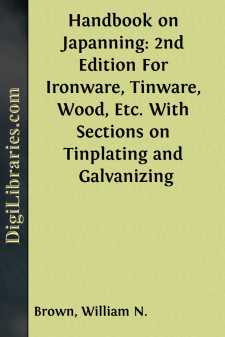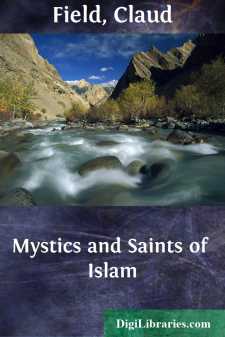Non-Classifiable
- Non-Classifiable 1768
Non-Classifiable Books
Sort by:
by:
Herbert Cook
CHAPTER I Apart from tradition, very few ascertained facts are known to us as to Giorgione's life. The date of his birth is conjectural, there being but Vasari's unsupported testimony that he died in his thirty-fourth year. Now we know from unimpeachable sources that his death happened in October-November 1510, so that, assuming Vasari's statement to be correct, Giorgione will have been...
more...
by:
F. J. Boudreaux
CHAPTER 1. THE BEATIFIC VISION. Reason, revelation, and the experience of six thousand years unite their voices in proclaiming that perfect happiness cannot be found in this world. It certainly cannot be found in creatures; for they were not clothed with the power to give it. It cannot be found even in the practice of virtue; for God has, in His wisdom, decreed that virtue should merit, but never enjoy...
more...
by:
Jacob Abbott
Herodotus and Xenophon. B.C. 550-401The Persian monarchy.Singular principle of human nature.Cyrus was the founder of the ancient Persian empire—a monarchy, perhaps, the most wealthy and magnificent which the world has ever seen. Of that strange and incomprehensible principle of human nature, under the influence of which vast masses of men, notwithstanding the universal instinct of aversion to...
more...
by:
William N. Brown
INTRODUCTION. Japanning, as it is generally understood in Great Britain, is the art of covering paper, wood, or metal with a more or less thick coating of brilliant varnish, and hardening the same by baking it in an oven at a suitable heat. It originated in Japan—hence its name—where the natives use a natural varnish or lacquer which flows from a certain kind of tree, and which on its issuing from...
more...
INTRODUCTION The Letter to Dion, Mandeville's last publication, was, in form, a reply to Bishop Berkeley's Alciphron: or, the Minute Philosopher. In Alciphron, a series of dialogues directed against "free thinkers" in general, Dion is the presiding host and Alciphron and Lysicles are the expositors of objectionable doctrines. Mandeville's Fable of the Bees is attacked in the...
more...
by:
Sherwin Cody
CHAPTER I HIS CHILDHOOD The Revolutionary War was over. The British soldiers were preparing to embark on their ships and sail back over the ocean, and General Washington would soon enter New York city at the head of the American army. While all true patriots were rejoicing at this happy turn of affairs, a little boy was born who was destined to be the first great American author. William Irving, the...
more...
INTRODUCTION TO redeem the monotony of plain surfaces has ever been the aim of all the arts, but especially that of the needle, which being the oldest expression of decorative intention, has, from the earliest time, been very dependent on its groundwork for its ultimate results. This is particularly the case in embroideries of the type of what is commonly known as Jacobean, where the ground fabric is...
more...
by:
Claud Field
PANTHEISTIC SUFISM I.—THE IMPORT OF ISLAMIC MYSTICISM The moral law proclaimed by Moses three thousand years ago agrees with that which governs men to-day, irrespective of their various stages of culture; the moral precepts of a Buddha and Confucius agree with those of the Gospel, and the sins for which, according to the Book of the Dead of the ancient Egyptians, men will answer to the judges of the...
more...
by:
Monsieur L'Abbat
CHAP. I. Of chusing and mounting a Blade. Courage and Skill being often of little Use without a good Weapon, I think it necessary, before I lay down Rules for using it, to shew how to chuse a good Blade, and how it ought to be mounted. The Length of the Blade ought to be proportionable to the Stature of the Person who is to use it: The longest Sword, from Point to Pommel, should reach perpendicularly...
more...
Sir Walter Scott When I was asked to choose a subject for a lecture at the Sorbonne, there came into my mind somehow or other the incident of Scott's visit to Paris when he went to see Ivanhoe at the Odéon, and was amused to think how the story had travelled and made its fortune:— 'It was an opera, and, of course, the story sadly mangled and the dialogue in great part nonsense. Yet it was...
more...











